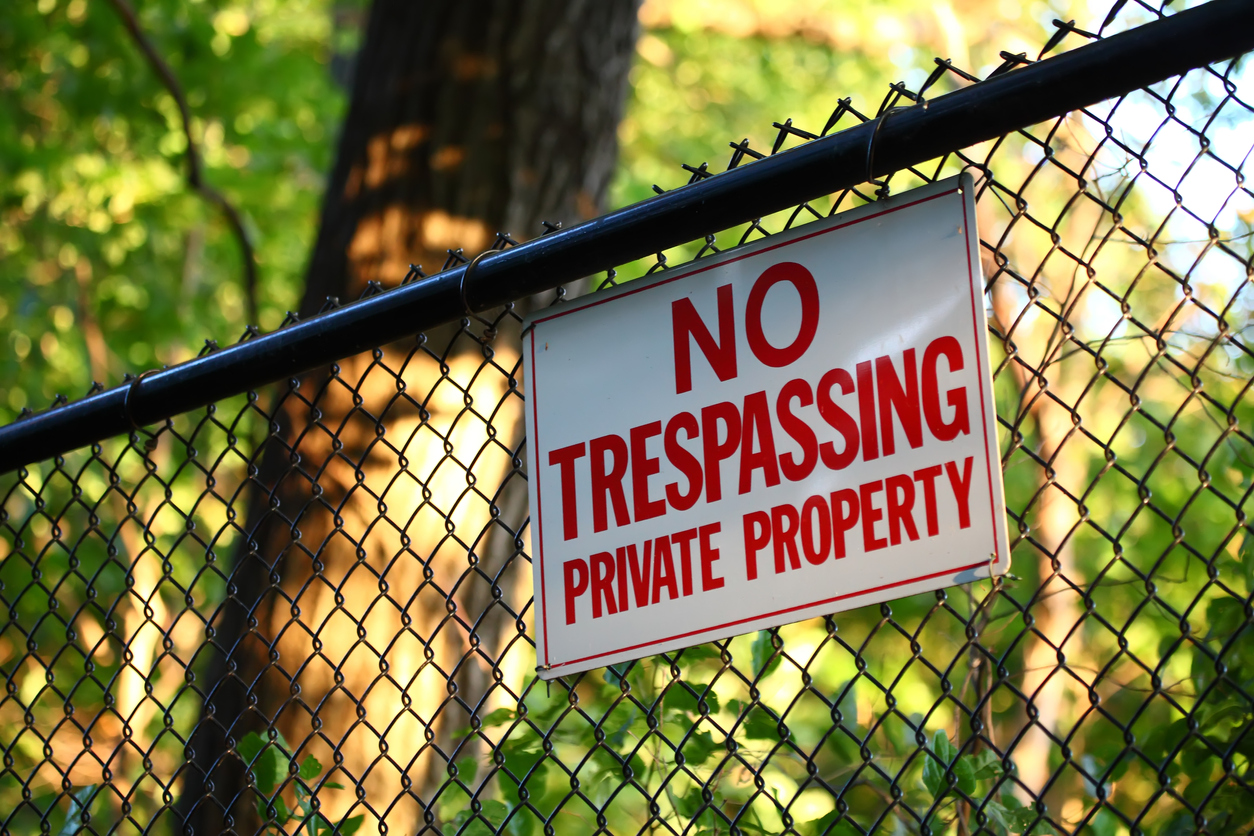What Is Considered Criminal Trespass in California?

There are different types of trespassing charges in California, and the severity of the charges depends on the circumstances that led to the offense. It can be charged as an infraction, a misdemeanor, or a felony, but most cases of trespass are charged as misdemeanors.
Penal Code 602 specifically states the different means by which a person can commit trespassing. This includes:
- The destruction or stealing of personal property belonging to the owner
- Damaging or destroying any signs
- Entering a property without permission
- Tearing down a fence
- Driving a vehicle upon the property without consent
- Refusing to leave the property after being asked to do so
- Entering closed or restricted land
Any of these actions can result in a trespassing charge.
Entering a property without permission is one of the most common forms of trespassing. This can include entering land, a building, or a residence without the owner’s consent.
Penalties for Trespassing in California
Charges for trespassing can range from an infraction to a felony:
Infraction Trespass
An infraction is the least severe trespassing charge in California. The penalty for a first-time offender is a fine of $75, and a second offense on the same property carries a fine of $250.
Misdemeanor Trespass
Misdemeanor trespassing is the most common form of criminal trespass in California.
In most cases, it is punishable by six months in jail and a fine of up to $1,000.
Instead of jail time, a first-time offender is frequently sentenced to probation or community service. The punishments for a second or subsequent charge are more severe.
Aggravated Trespass
Aggravated trespassing is a much more severe offense that occurs when someone makes a credible threat of violence and enters the owner’s property within 30 days of making the threat.
It is considered a wobbler, which means it can be charged as either a misdemeanor or a felony. A misdemeanor carries a possible one year in jail and/or fines of up to $2,000, while a felony can result in three years of jail time and/or a fine of up to $10,000.
The severity of the charges will be determined by the prosecutor and will depend on the facts of the case.
Legal Defenses to a Trespassing Charge in California
The following defenses may apply in a trespassing case:
Consent
One of the most common defenses to a California trespass charge is consent – showing the right or consent to be on the property. For instance, if a person is invited into a home for dinner, they are not trespassing.
Additionally, if a visitor is on a piece of property for valid reasons, such as inspecting pipes, they are not trespassing.
The Defendant Did Not Act Willfully
Another legal argument a defendant has is that they did not enter the property knowingly, indicating that they did not intend to trespass.
For example, if someone entered the wrong property by accident, they did not act willfully. It is important to note that intent is a crucial factor in a trespassing case. If there is no intent to trespass, the charges may often be dropped or lessened.
Insufficient Signage
Another way to fight the charges is to prove that the property was not completely enclosed with a fence or marked with “no trespassing” signs. In California, there are certain legal requirements for how properties should be marked to prevent trespassing.
If the property does not comply with those requirements, it can be difficult for the prosecutor to prove the defendant committed trespassing.
Why You Need a Los Angeles Criminal Defense Lawyer For Help Fighting Trespassing Charges
Trespassing laws in California can be confusing and complex. With a lawyer’s help, you can navigate the legal system and understand the charges against you. A Los Angeles trespassing lawyer can explain the relevant laws, the potential consequences of a conviction, and the options available to you. This knowledge can be invaluable in making informed decisions about your case.
If charged with trespassing, you will need to mount a defense in court. A lawyer with experience in trespassing cases will understand how to build a solid defense, gather evidence, and interview witnesses.
Additionally, a lawyer can work with prosecutors to negotiate a plea deal that reduces or dismisses the charges against you. A plea deal can help you avoid the harsh penalties associated with a trespassing conviction. Experienced lawyers can also fight to have evidence suppressed or the case dismissed in court.
For help with a trespassing charge, contact a Los Angeles criminal defense attorney for a free consultation.
Contact the Los Angeles Criminal Defense Law Firm of The Rodriguez Law Group Los Angeles Criminal Defense Attorneys Today For Help
For more information please contact the Los Angeles Criminal Defense law firm of The Rodriguez Law Group Los Angeles Criminal Defense Attorneys for a free consultation, give us a call at (213) 995-6767 or visit our convenient location:
The Rodriguez Law Group – Los Angeles Criminal Defense Attorney
626 Wilshire Blvd Suite 460, Los Angeles, CA 90017, United States


